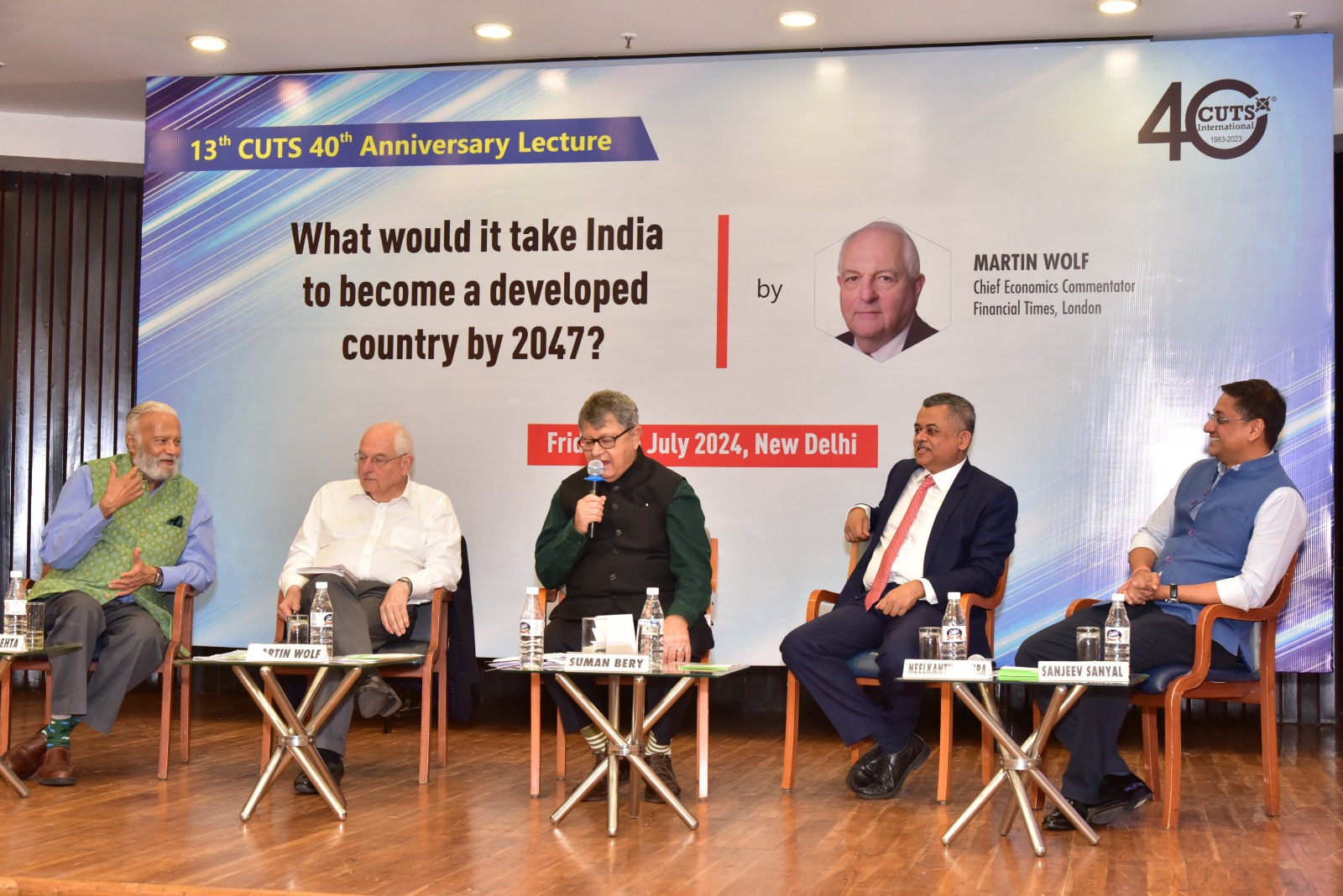
“India’s is likely to be the second-largest economy by 2047 as per the PPP method behind China and ahead of the US. Such a position of strength has significant implications for the world” expressed by Martin Wolf, Chief Economics Commentator at The Financial Times, while speaking at the 13th CUTS International 40th-anniversary lecture titled “What would it take India to become a developed country by 2047?”.
Wolf mentioned that despite the global economic slowdown and uncertainties, India has significant opportunities. India should focus on maintaining openness, investing in physical and human capital, and leveraging its comparative advantage in services. Effective domestic policies and strategic international relations are crucial for India’s progress.
The event, hosted by CUTS International, also featured distinguished panellists Suman Bery, Vice-Chairman of NITI Aayog; Neelkanth Mishra, Chairperson, UIDAI; Montek Singh Ahluwalia, Former Deputy Chairman of the Planning Commission; Pradeep S Mehta, Secretary General of CUTS International; and Sanjeev Sanyal, Member of Economic Advisory Council to the Prime Minister of India.
This significant gathering of experts, policymakers, and stakeholders delved into the actionable strategies and necessary reforms required for India to achieve its ambitious goal of developed nation status within the next quarter-century.
Martin Wolf emphasised the critical importance of sustained economic reforms and robust growth. Highlighting the challenges, he observed that “slobalisation or slowdown of the ratio of trade to global GDP is potential external risk and friend-shoring or investing only in friendly economies are potential challenges to India’s growth trajectory.”
Reflecting on the Amrit Kaal goals, Niti Aayog Vice Chairman noted that “To achieve Viksit Bharat by 2047, realising supply-side growth potential is crucial. Scaling up manufacturing and enhancing innovation are necessary to become a developed economy.”
Noted economist and UIDAI chairman, Neelkanth Mishra highlighted the role of modern infrastructure and smart urbanisation. “India needs to adopt the strategy of small-yard high fencing to deal with a much stronger economy like China, focusing on targeted protection and strategic autonomy.” Mishra noted.
Montek Singh Ahluwalia, former deputy chairman of the Planning Commission discussed the importance of good governance and a robust policy framework. “India is in a sweet spot compared to China given the fact that the world is undergoing uncertainty with policies moving in the wrong direction. India can cash on its advantage by realigning FTA standards.” Ahluwalia remarked.
Sanjeev Sanyal, a member of PMEAC stated “India’s population growth rate is getting moderated which is likely to yield better per capita income. Globally, ageing population will lead to a sticky savings rate and excess and cheap capital. India will have access to such capital which is likely to accelerate growth trajectory. Such cheap capital will need to be sensibly allocated across strategic sectors.”
Pradeep S. Mehta, secretary general of CUTS focused on the significance of global integration and trade partnerships. “India is improving its business environment by reducing regulation burden and signing FTAs to attract foreign trade and facilitate investment to boost its economic growth.” Mehta suggested.
The panellists collectively stressed the need for a comprehensive and strategic approach, encompassing economic, social, and environmental dimensions, to ensure sustainable and inclusive development.
The event concluded with a call to action for policymakers, industry leaders, and stakeholders to collaborate and drive the necessary reforms and initiatives. By leveraging its unique strengths and addressing critical challenges, India can pave the way towards becoming a developed nation by 2047.
